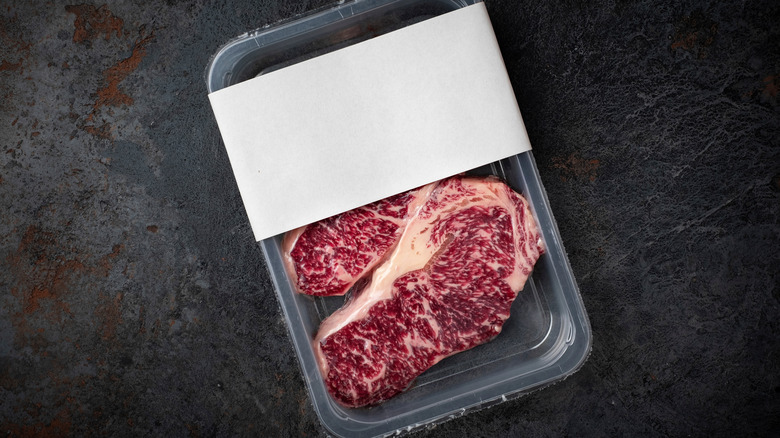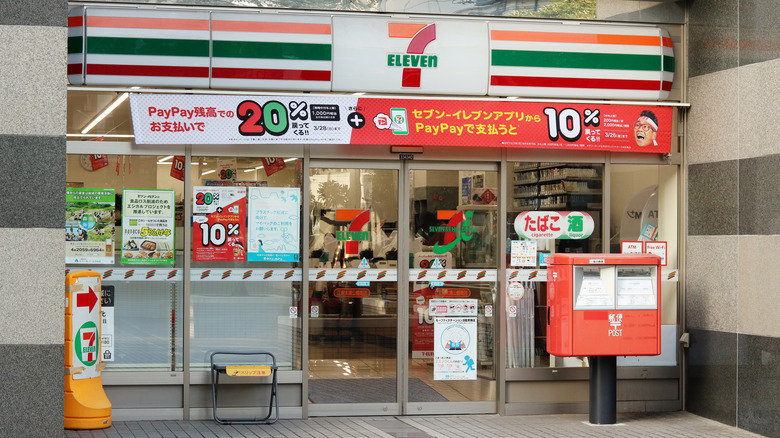The Japanese Convenience Store With No Employees And Wagyu Beef 24/7
For many of us living in the Western World, there can be a lot to learn about Japanese cuisine. Those who only speak English might be left scratching their head when they hear the terms "chado," "izakaya," "kaiseki ryori," "washoku," and "yakumi." One often overlooked aspect of Japan's food culture, however, is convenience stores, also known as "konbini."
Just like Japanese vending machines, the island nation's convenience stores are more elaborate than they initially appear. Yes, they're little shops that offer a relatively small selection of pre-made food at practically all hours of the day. However, they also allow folks to buy tickets, pay bills, and send mail, and one konbini chain even lets customers purchase Wagyu beef 24/7 without any worker assistance.
Ouchi de Oniku, as reported by SoraNews24, is a branch of over one hundred konbini shops that sell meat all day long (and night) despite having no employees present. Its honor system allows consumers to grab products such as beef tongue, for example, and ring themselves up without the use of in-store barcodes or online applications. There are security cameras watching, and the prices are a bit higher than at the supermarket, but still, this is one innovative way to cross frozen protein off your grocery list. As long as you don't mind thinking about cute animals when you buy butchered meat, you'll also likely enjoy the cartoonish cows, pigs, and roosters — illuminated by neon pink lights — on the storefront windows.
How did konbini become so unique?
Ouchi de Oniku is ultimately just one example of how specialized and cutting-edge konbini can be. As mentioned, Japanese convenience stores regularly transcend their American counterparts, but it wasn't always this way. In fact, the U.S. chain 7-Eleven is what originally kickstarted Japan's konbini industry.
Ito-Yokado, a Japanese department store chain, attained the rights to franchise 7-Elevens in Japan around the start of the 1970s. In residential zones where large stores were not permitted, these smaller shops catered to the casual customer. Unfortunately, the locals were skeptical, and it wasn't until the late '70s, when fresh onigiri rice snacks were added to the shelves, that Japanese citizens took notice. Delivery times shortened as well, ensuring that Japanese 7-Elevens were always well stocked. Then came the creative idea of offering non-retail services (tickets, bills, mail), which truly set the konbini apart and even made Ito-Yokado successful enough to acquire majority shares of 7-Eleven circa 1991. The student had officially become the master.
Other brands joined over time. FamilyMart, for instance, has grown by snatching up failed competitors. Lawson, meanwhile, markets products under its Natural Lawson brand to its health-conscious shoppers. At its height, this konbini industry featured over 50,000 stores that cumulatively made trillions of yen, annually, but things have changed recently. The market is oversaturated, while online delivery services compete for attention. However, as exemplified by Ouchi de Oniku, there may be a path forward to revitalized konbini success.
Is automation the future of convenience?
Ouchi de Oniku is not alone with its business model. Recently, many konbini shops have been exploring contactless options. For example, in 2021, FamilyMart announced it would be unveiling a thousand unmanned locations by the end of its 2024 fiscal year. Just like Ouchi de Oniku, these will be heavily monitored by security cameras, but they'll differ in a few important ways. For one thing, this will be the first time a major chain has widely implemented such a system in Japan. For another, FamilyMart is using artificial intelligence and weight sensors to further monitor customers and keep track of how much they owe. Plus, practically all of FamilyMart's usual offerings — not just frozen meat — will be available.
7-Eleven is now following suit with facial recognition. Lawson also has its own unmanned locations called "Lawson Go" where shoppers use smartphones to enter and then pay for items. Sort of splitting the difference between manned and unmanned, Lawson recently opened the Green Lawson, as well. There, real-life workers connect via screens to answer in-store questions and process special requests as cartoon avatars.
Behind all of these developments is an ongoing labor shortage in Japan as well as the never-ending march of improving technology. The Japanese government has actually scaled back food safety requirements regarding onsite staff to enable such changes. Automated stores may currently cost more to operate, but in the future, Ouchi de Oniku may become industry-standard, making konbini even more kon-venient.


